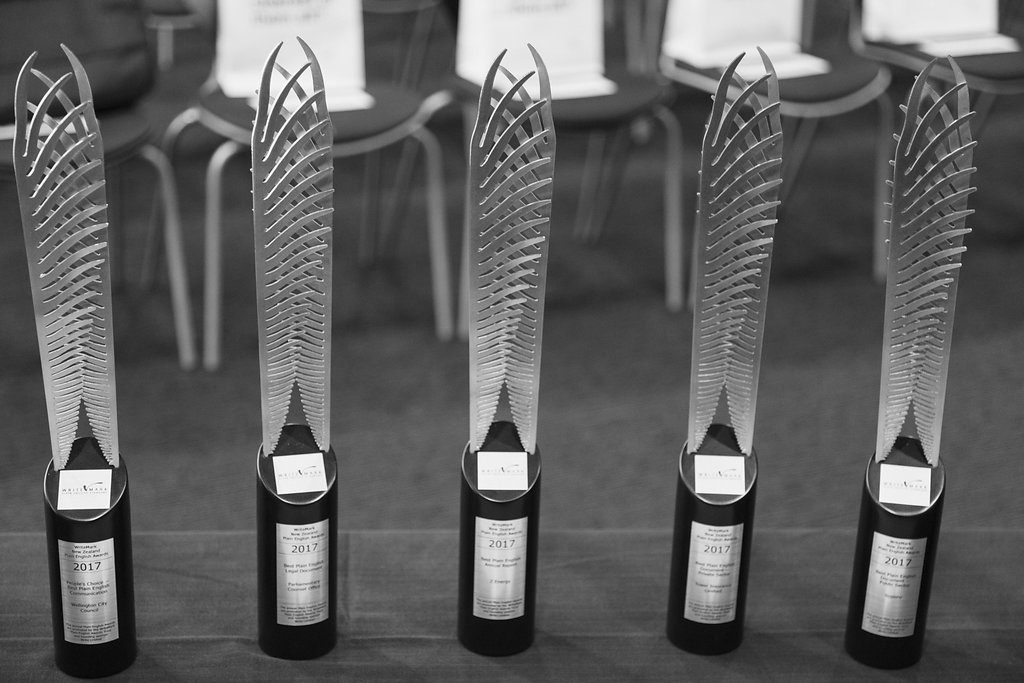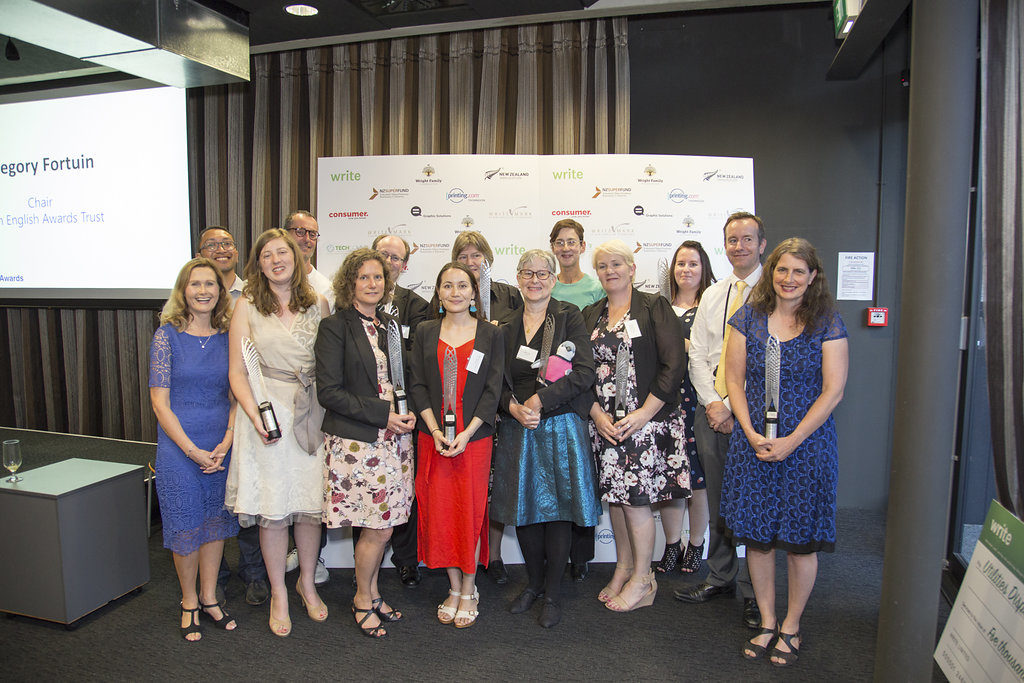
A beautiful handmade trophy is one of several prizes in store for Accuro Health Insurance. Image by A Beautiful Photo
Our rights and obligations are enshrined in the law. But we can’t claim those rights or fulfil those obligations if we don’t understand them. Understanding truly is power. It unlocks our democratic rights.
That fact is recognised in the Plain English Awards category, Best Plain English Legal Document.
Last year’s winner sets the standard for legal drafting
The document that won last year was a mammoth effort. A team from the Parliamentary Counsel Office (PCO) combined twelve Acts into one: the Contract and Commercial Law Act 2017.
The judges said, ‘Parliamentary Counsel Office did a great job of combining multiple acts that were a confusing hodgepodge of legislation into a single intelligible act.
‘A clear understanding of the audience and consultation with these groups made the project stronger. The explanations in the legislation were particularly useful.
‘The revised Act is a great step forward in New Zealand for plain English legislation. And the intended audience has a much clearer picture of contractual law in New Zealand.’
You can enter any kind of legal document
Are you thinking of entering this Awards category? The 2017 winner is a hard act to follow, but don’t feel you have to try, says Awards organiser Melissa Mebus.
‘Any kind of legal document is worth entering — whether it’s long and complex or short and simple. The important thing is that it’s about a legally enforceable law, process, obligation, or right. Examples are contracts, T&Cs, notices, and legal opinions.’
Plain English legal writing brings business benefits
The tide is turning in favour of plain English in legal writing in New Zealand and overseas. Plain language practices report happier clients and increased business. And plain English can bring unforeseen benefits, with more clients meeting deadlines just one example.
One document, two entries
The PCO team also entered the rewritten Act in the Best Plain English Turnaround category, where it was shortlisted. Melissa says, ‘We welcome multiple entries for the same document. A good document or website can tick many plain English boxes, and should get the recognition it deserves.’
To enter, you have to submit the original document or webpage as well as the rewrite. The rewrite must be in current use.
Improve your chances of winning an award
Find out how to give winning your best shot at the Awards Trophy Tips Seminar on Friday, 4 May. You’ll get expert advice from past winners, judges, and supporters of the Awards. Attendance is free — book for the Trophy Tips Seminar online.
Entries now open on Monday, 7 May
We said we’d open on 1 May but we need a little bit of extra time as we upgrade to a new entry platform. Watch for entries opening next Monday, 7 May. Entries close on Friday, 31 August.
Melissa Mebus April 30th, 2018
Posted In: 2018 Plain English Awards, Finalists, Legal writing, Plain English Awards, Trophy Tips Seminar
Tags: 2018 Plain English Awards, Best Legal Document, Legal writing, Trophy Tips Seminar

Learn tips from the experts on how to win. Photo by Ray Hennessy on Unsplash
On Friday, 4 May we’ll be celebrating entries opening for this year’s Awards with a free lunchtime seminar at Write Limited in Wellington.
Hear how to be a winner from the experts
We’ve gathered together a panel of experts to give you tips on how to submit a winning entry. You’ll get expert advice from past winners, judges, and supporters of the Awards, upping your chances of a successful entry.
During the seminar our panel will explain:
- what judges look for in a winning entry
- what’s involved in submitting an entry
- what winning an Award means for an individual or organisation
- why every entry plays an important part in helping everyday New Zealanders.
Book your tickets now
You’ll have plenty of time to ask questions. Bring your own lunch — we’ll supply coffee, tea, juice, and fruit.
Places are limited so book your tickets now. Entry by koha.
Melissa Mebus April 11th, 2018
Posted In: 2018 Plain English Awards, Plain English Awards, Social good, Trophy Tips Seminar
Tags: 2018 Plain English Awards, Plain English Awards, Trophy Tips Seminar, Turnaround Award

Everyone wins with a sound sponsorship agreement. Photo by Shirly Niv Marton / Unsplash
Sponsorship isn’t about giving away money to a good cause: that’s donating. Sponsorship offers two parties the opportunity to be part of a win–win agreement.
In return for their support, sponsors get the same feel-good factor they would get from donating. But on top of that, they also get a return on the investment in their chosen cause. So, true sponsorship offers an organisation something sustainable and tangible in return for its commitment.
Sponsors get clear returns on their investment
Sponsoring the Plain English Awards offers clear returns on your investment, such as:
- alignment with plain English values. You’re seen as customer-focused, transparent, and trustworthy
- brand exposure. Forget about advertising! You’ll be widely promoted in our Awards publicity, reaching large groups of potential new customers
- networking opportunities. Plain English Awards entries come from a huge range of public and private organisations. The networking opportunities you get from Awards forums (in person and online) offer a hugely valuable return, as does the actual presentation ceremony.
Is your organisation a sponsorship ‘best match’?
Looking at the values and aims of the Plain English Awards, and from our past experience, we know the types of organisations that benefit most from sponsorship.
If you can answer ‘Yes’ to any of these questions, sponsoring the Plain English Awards could be just the thing for you:
- Do you want to reinforce to your clients or customers that you always work with their best interests in mind?
- Do you want to reinforce to your clients or customers that you are transparent in your dealings with them and with other organisations?
- Do you want to be part of a movement to improve government and business documents so that all New Zealanders can understand them?
- Do you want to help build a public preference for plain English?
- Do you love celebrating success?
Answered ‘Yes’ to one of more of these questions? It’s time for a conversation!
We’d love to hear from you
Get in touch if you’d like to talk through sponsorship opportunities at this year’s Awards. We’d love to discuss a sponsorship arrangement that would benefit both the Awards and your organisation.
Phone: +64 4 384 6447
Email: [email protected]
Visit our website for more information about the 2018 Plain English Awards
Melissa Mebus March 13th, 2018
Posted In: 2018 Plain English Awards, Plain English Awards, Social good, Sponsors
Tags: 2018 Plain English Awards, Plain English Awards, Social good, Sponsorship

Information for new migrants needs to be as clear and user-friendly as possible. Image by Dmitri Ratushny. Unsplash licence.
You’ll all be familiar with the idea of the world becoming smaller as fast-paced communications connect even the remotest places on earth to the wider world. With the click of a button we can instantly be in touch with someone as far afield as Siberia in the far north and Antarctica in the far south. But does the amount of communicating we’re doing necessarily mean that we’re understanding each other?
What if I just speak a little louder?
I don’t have to dig too deep into my own experiences of travel outside New Zealand to know how difficult a language difference can make life. I even remember once falling into the dire trap of increasing my volume to try to get my message across. How was that ever going to work? Luckily for me (but not the poor person I was talking to), our topic of attempted conversation wasn’t too important.
So what must life be like for the many migrants who make their way to New Zealand each year and don’t speak English fluently? To put things in perspective, a quarter of New Zealand’s population was born overseas. And for many of these people, English is their second — or even third — language. Imagine what these statistics mean for an organisation like Immigration New Zealand (INZ), which needs to communicate ideas, many of them complex, through a variety of mediums every day.
What plain English means for migrants to New Zealand
At the end of November last year, supporters of the annual Plain English Awards celebrated its 2017 winners at a ceremony in Wellington. INZ was one of the Awards’ valuable sponsors, and representative Anne-Marie Masgoret gave a brief address during the ceremony. While no one in the audience needed any reminding of the importance and value of plain English, Anne-Marie’s words served as terrific reinforcement.

Anne-Marie Masgoret, right, from sponsors Immigration New Zealand, with winners Anthony Frith and Bridget Cheesman.
‘Moving to live and work in a new country involves finding out a great deal of information that locals simply take for granted,’ Anne-Marie explained.
Focusing on user-friendly information
INZ’s goal is to help migrants make New Zealand their home. They aim to support these people to fully participate in and contribute to all aspects of New Zealand life. And they do this by communicating clearly and simply through a variety of mediums.
INZ also relies on other organisations to deliver their message directly to migrants.
‘New Zealand organisations are very good at providing newcomers with information. However, the information provided is not always written in a user-friendly way,’ said Anne-Marie.
‘For those new to New Zealand, the quality of information migrants receive as they settle into their new life here can make all the difference in the way they settle into this country and make it their home. It can also make a difference to whether a newcomer acts on information or just ignores it.’
Keeping it clear for those new to New Zealand
To support organisations to write clear communications, INZ created the Keeping It Clear resource. This aims to help organisations create or rewrite information in a short, simple, and easy-to-understand format.
Check out INZ’s Keeping it Clear resource
Find out about the winners of the 2017 Plain English Awards
Melissa Mebus March 1st, 2018
Posted In: Finalists, Plain English Awards, Sponsors
Tags: Plain English Awards, sponsors, Turnaround Award
WriteMark Plain English Awards founder, Lynda Harris, gave a stirring speech to a sell-out audience at the 2017 Plain English Awards. She encouraged us all to think bigger and do more. Here’s what Lynda said.

Lynda Harris
Annual awards reward and motivate
Twelve years ago we had the bold idea of publicly honouring those organisations that were really trying to make important information clear.
And it worked.
Not only do we have plentiful anecdotal evidence about the motivating effect of the annual Plain English Awards, but we also have a ton of great comments in the surveys we’ve done.
‘The Awards help motivate us to get it right for the people that need good information the most.’
It becomes very real when we see forms that are easy to fill out; contracts and conditions made straightforward; and vital healthcare information written in a reader-friendly way.
We love comments like these: ‘We finished by lunchtime what would normally take us all day.’ Plain English makes everyone’s life easier!
Struggling to find support
But a lot of the work has been done by not many people. Even though more organisations are producing reader-friendly publications, not enough people in those organisations understand the power of clear communication and its potential to transform organisations and lives.
The people who do understand often beaver away on their own or in a small group with little support. Often they retreat a bit and accept that there is only so much they can do.
That’s a huge opportunity lost, and and a massive consequence cost.
A dose of inspiration with positive side effects
I have to admit I was in this frame of mind recently when I got a dramatic and unexpected dose of inspiration from two remarkable speakers. They shared an incredible story, which reminded me that if we believe in the worth of something, we can inspire others to join us and make something big happen. It made me think of the Marianne Williamson quote, ’Your playing small does not serve the world’.
I want to share a snippet of that inspiring story with you — with the not-so-secret agenda that I want you to realise you have the desire and the power to do more!
This is the story of 19-year-old Australian Daniel Flynn and his two friends, who came up with the audacious plan to end world poverty in their lifetime. They’d seen a documentary about children in other parts of the world dying every day from a lack of clean water. Their plan was to start a bottled water company, and use 100 percent of the profits to create clean water and sanitation projects where they were needed most.
Impossible is an opinion
Of course people said it was impossible.
Daniel said, ‘Impossibility is only someone’s opinion, not a fact.’
Most of the people Daniel pitched to, and plenty more besides, said, ‘It won’t work.’
Daniel said, ‘But what if it does?’
They started with $1,000 between them and zero experience in anything to do with business, overcoming obstacles of every sort, and asking Google ‘How to start a bottled water company?’
Eight years on, still in their twenties, they are running a very different and highly successful company with no investors, no shareholders, and no debt: a company that gives 100 percent of its profits away.
They have given $5 million to provide water and sanitation services for 441,530 people, and food aid for 124,737 people. They have humanitarian projects running in 18 countries.
And they did it through an unwavering belief in the good they could do, sharing that belief boldly and creatively. They built a community who believed with them. And they called their company ‘Thankyou’.
Borrow boldness for what you believe in
Listening to Daniel and his wife speak, I felt a new-found energy for everything I believe in. ‘If these young people can do so much, starting with nothing more than conviction, what can I do?’ And it’s stayed with me.
I thought of Margaret Mead’s words, ‘Never doubt that a small group of thoughtful, committed citizens can change the world. Indeed, it is the only thing that ever has.’
Which leads me to ask a personal question. In your workplaces, under your influence — thinking of how you currently communicate with each other and give vital information to New Zealanders — what change do you want to see?
What if you were to multiply by 20 (or 100!) the positive effects of the documents and websites entered into the 2017 Plain English Awards? What would it take to do that?
The economic and social good that flows from a focus on clear, meaningful communication is easy to find — in fact, we wrote a book about it.
I’m hoping now that by borrowing some boldness from three young people who are changing the world in mighty ways, you feel inspired to advocate even more strongly for what you believe in.
To do that you’ll need to do something differently, to challenge the status quo, and politely shut your ears to detractors — I truly hope you will!
Nicola Welby December 1st, 2017
Posted In: Awards brand, Finalists, Plain English Awards

Winners of the 2017 Plain English Awards
Congratulations to all our winners and finalists!
Utilities Disputes was the big winner at the 2017 Plain English Awards held at the Royal Society Te Apārangi in Wellington last night. Jerome Chapman, Deputy Commissioner, received the Best Organisation supreme award on behalf of the not-for-profit company. The judges noted:
Utilities Disputes has deliberately embedded plain English into the core of its organisation culture. And its perseverance and commitment have obviously paid off. They are truly plain English champions, and deserve recognition for their expertise and commitment to plain English philosophy.
Utilities Disputes won services worth $5,000 from New Zealand’s plain English specialists and founding sponsor, Write Limited.
Another champion recognised
The other award in the Champion category went to Steph Prince from NZ Transport Agency for Best Individual or Team.
Praise for best documents and websites
The award for the Best Plain English Document for the private sector went to Tower Insurance Limited for their House Insurance Premium Cover. Superu took out the award for the public sector with Making Sense of Evaluation — a handbook for the social sector.
The Best Plain English Website award went to the Department of Internal Affairs for the govt.nz website. This informative yet accessible website has won before.
Re-thinking a document or website to improve it
The Best Plain English Turnaround award went to Ministry of Civil Defence & Emergency Management for its happens.nz website, replacing the Ministry’s getthru.govt.nz website.
Legal, Technical Communicator, and Annual Report categories
Parliamentary Counsel Office took out the Best Legal Document award for its Contract and Commercial Law Act 2017.
The Best Plain English Technical Communicator was Louisa Eades from Streamliners.
Z Energy won Best Plain English Annual Report for its 2017 report titled Solving what matters for a moving world. 2017 Annual Report.
Spotlight on the humble sentence
Jan Schrader at Stats NZ won the award for Best Sentence Transformation. Stats NZ has won in this category before, most recently in 2015.
People’s Choice — the best and the worst
Members of the public also submitted entries for two categories. The People’s Choice awards recognise the best and worst in government and corporate communications. Wellington City Council won the Best Communication award for its Our Wellington magazine. Of this entry the judges said:
What’s not to like? The document’s intention is clear and headings highlight the key messages. It has a vibrant design, clear statement headings, friendly language, and good variety. It successfully combines drier council initiatives with more exciting information on events. This good piece of work is probably well liked by Wellingtonians.
The People’s Choice Worst ‘Brainstrain’ award went to Inland Revenue. The Department received this could-do-better award for its direct debit conditions. The judges said, ‘This is supposedly an explanation of the conditions under which Inland Revenue has authority to accept direct debits — we think!’ The person who nominated the document said:
‘Inland Revenue say they have improved their website and made it easier to do business. But when you choose to pay by direct debit and two days later this nonsense is emailed to you — from a do not reply email so there is no way to ask for plain English — they could do better.’
Inland Revenue responded in good spirit with a humorous video.
The benefits keep coming after 12 years
After 12 years of Awards, we’re really starting to reap the benefits of business and government using clear communication to engage with their clients, consumers, and customers.
Chris Trudeau, US plain language specialist and professor of law, has said that New Zealand is ‘far ahead of the game’ in plain language. And this year, judges felt only one entry truly qualified as a ‘Brainstrain’. That’s got to be good news! And may this trend of constant improvement continue.
The 2017 Awards received entries from new entrants and previous award entrants. So it’s evident that those entrants recognise the benefits of New Zealanders receiving messages that are clear, concise, and consistent.
As Gregory Fortuin, chair of the WriteMark Plain English Awards Trust, explains, ‘Think of people caught in an emergency getting fast help from their insurer through an easy-to-complete claim form. Or patients experiencing less stress because they can easily understand their treatment. Or investors being able to understand their investment options from reading a clear investment statement. Communications written in plain English really can improve the lives of everyday Kiwis.’
Thanks to our 2017 sponsors
Major sponsors for this year’s Awards included WriteMark Limited, Write Limited, NZ Super Fund, Immigration New Zealand, printing.com, Wright Family Foundation, TechCommNZ, Graphic Solutions, and Consumer NZ.
Other sponsors, whose contributions to the Awards were also invaluable, were Kendons, Editor Software (United Kingdom), JUNO Investing Magazine, Community Comms Collective, Business NZ, Shelly Davies Writing & Training, Summer KiwiSaver Scheme, and Justly.
Nicola Welby November 24th, 2017
Posted In: Communications

From shortlists to finalists — decisions have been tough. Photo by Gaelle Marcel on Unsplash
After some tough deliberations from our judges, here are the finalists in the 2017 Plain English Awards.
As with our shortlists, entries are in no particular order. We haven’t published finalists in some categories so we don’t let the cat out of the bag.
‘Ooh — awesome’
Read some of the feedback we’ve had from judges about this year’s finalists below.
- ‘All three judges found this to be the very best group of entries we have seen in our many years judging these awards.’
- ‘We applaud the effort everyone has made to follow the principles of plain writing.’
- ‘You can be especially proud to win this category among these excellent entries!’
- ‘The friendly, light tone in this rewrite is a delight.’
- ‘When I finished the rewrite I said aloud “Ooh – awesome”.’
- ‘Overall this is an excellent effort.’
Winners will be announced on 23 November
We’ll announce our winners at the Awards ceremony in Wellington on 23 November. We’ll also publish the list of winners on our website later that evening.
Nicola Welby October 20th, 2017
Posted In: Awards brand, Communications, Finalists, Plain English Awards
Tags: clear communication, Finalists, Plain English Awards, plain language

The decisions were tough but our shortlists are out. Photo by Samuel Scrimshaw on Unsplash
We’ve had plenty of positive and productive feedback about this year’s entries, with several judges commenting on how tough their decision-making has been. One judge summed up the dilemma perfectly: ‘This competition is stiff, and we will have to do some real work to sort out the best of the best.’
Take a look at this year’s shortlists
Entries on the shortlists are in no particular order. If we haven’t published a shortlist, it means we can’t let the cat out of the bag just yet. In some categories we had fewer entries that met the judges’ high standard.
Look out for the list of finalists on 19 October.
Nicola Welby September 28th, 2017
Posted In: Communications, Plain English Awards
Tags: 2017 Shortlists, clear communication, People's Choice, Plain English Awards

One more day to submit entries! Photo by Chris Lawton on Unsplash
We’ve extended cut-off by one day
We’ve had a few enquiries from people confused about our cut-off date for entries. The confusion has been between the end of the month (yesterday) and the end of the week (today). So we’ve extended the cut-off until 6pm today. That’s right folks, you’ve got one whole extra day to get your entries in!
Nicola Welby September 1st, 2017
Posted In: Plain English Awards
Tags: Plain English Awards

Time to celebrate! Photo by Tessa Rampersad on Unsplash
Why do we hold the annual Plain English Awards? What is it exactly that we’re trying to achieve?
Celebrating individuals and organisations that put the needs of their readers first
Everyone’s talking about it — busy people leading busy lives. Everyday people are regularly expected to read what can be critical information in a variety of mediums. But if the information they’re getting is written or presented in a way that makes it difficult to process, essential messages can get lost or muddled.
The Plain English Awards celebrate individuals and organisations that put the needs of their readers first. The Awards aim to:
- improve government and business documents so that all New Zealanders can understand them
- raise public awareness of the need for, and benefits of, plain English
- create a public preference for organisations that choose to communicate in plain English.
How seemingly small changes can make a big difference
Last year Wellington author and writing trainer Simon Hertnon was a judge in the People’s Choice section of the Plain English Awards. He and his panel members chose the winner of the Best People’s Choice — Best Plain English Communication and the People’s Choice — Worst ‘Brainstrain’ Communication.
Simon shared his impression of the two winning entries in his recent blog post about the critical influence of tone in a formal document. Suitable tone is a key component of any plain English document. And last year’s winner of the Best Plain English Communication Award offered a perfect example of how effective good tone can be. The winner of the Brainstrain Award, however, illustrated the alternative.
‘One winning entry illustrated why the default writing style of business and government — which I would characterise as formal, exhaustive, and impersonal — regularly fails to meet the needs of today’s information-overloaded reader,’ Simon says in his blog post.
‘The other winning entry provided an exemplar for what business and government writers can and should do to improve the quality and usefulness of their writing. That is, to employ a familiar, confident, no-nonsense tone.’
Time to get your entries in for the 2017 Awards
Have you submitted your Awards entries yet? Don’t miss out — enter now
Nicola Welby August 30th, 2017
Posted In: Plain English Awards
Tags: Brainstrain, People's Choice, Plain English Awards, Simon Hertnon












